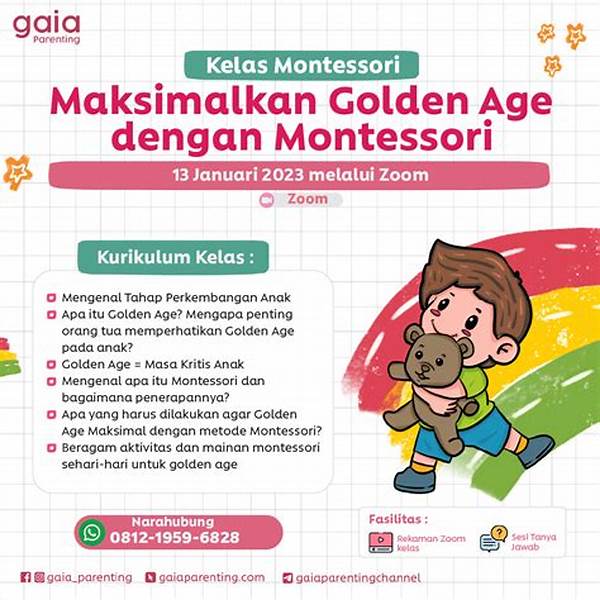The allure of the Montessori curriculum lies in its unique approach to education, one that has earned a profound reputation worldwide for fostering independent thought and creativity among young learners. Unlike traditional education systems that often emphasize uniformity and standardized testing, the Montessori method cultivates an educational experience tailored to each child’s individual needs and interests. At the heart of this approach is the belief that children learn best when they are allowed to explore subjects they are passionate about at their own pace, using hands-on learning activities that engage multiple senses.
Read More : Practical Life Skills Breakthrough: How To Get Your Preschooler Doing The Dishes (happily)!
For parents seeking an alternative to conventional education, the Montessori curriculum is a breath of fresh air—a philosophy grounded in respect for the child’s natural psychological development. Imagine a classroom where the boundaries typically dividing subjects like math and science are blurred, replaced by the seamless integration of disciplines that reflects the interconnectedness of the real world. Montessori classrooms are filled with intriguing learning materials that stimulate curiosity, encourage problem-solving, and promote an intrinsic love of learning. This is not just education; it’s a dynamic environment where children are free to discover their potential.
While some might worry that the absence of traditional grades could leave students ill-prepared for “real-world” evaluations, research suggests the opposite. Montessori students often outperform their peers in critical thinking, problem-solving, and even standardized testing. The Montessori curriculum is not a one-size-fits-all solution—it’s a customizable journey of discovery that respects the child as a unique individual capable of self-directed learning.
The Montessori Curriculum’s Impact on Child Development
The Montessori curriculum is a suitcase packed with practical learning tools designed to nurture independence and self-motivation. Imagine a world where children are excited about learning, not because a test is looming on the horizon, but because their inherent curiosity is being fed. The Montessori method promotes a rich, engaging learning environment where teachers serve more as guides than traditional instructors.
In a typical Montessori classroom, the scenery is quite different from mainstream education. You’ll find children of varying ages working harmoniously, learning from one another in a community that values collaboration over competition. The learning materials are carefully designed to be self-correcting, allowing children to identify their mistakes and learn autonomously. This hands-on, experience-based approach is what the Montessori curriculum is all about: education that adapts to the child, not the other way around.
Goals of the Montessori Curriculum
The Montessori curriculum has several goals that contribute to the holistic development of a child. Here are nine objectives that the Montessori method aims to achieve:
These goals create a robust foundation for lifelong learning, ensuring that children leave the Montessori system well-prepared for the future.
The Philosophy Behind the Montessori Curriculum
At its core, the Montessori curriculum is an educational philosophy that sees children as naturally eager for knowledge and capable of initiating learning in a supportive, prepared environment. This approach is designed to bring forth a child’s true potential by focusing on their natural interests and talents, rather than imposing a predetermined structure. Through self-directed activity, hands-on learning, and collaborative play, the Montessori curriculum is dedicated to nurturing the whole child—socially, emotionally, intellectually, and physically.
Research has shown that students educated under the Montessori curriculum often display remarkable levels of self-discipline and enthusiasm for learning, compared to those in traditional systems. Dr. Maria Montessori’s educational reforms have created a system where education is an engaging, forward-thinking process, constantly evolving with the needs of its students. This adaptability makes the Montessori curriculum not just a method of teaching, but a lifestyle choice for many families.
Why Choose the Montessori Curriculum?
The Montessori curriculum is not just another pedagogical method—it’s a journey that transcends traditional education by nurturing well-rounded, self-reliant individuals ready to face the world with confidence. This curriculum is as much about character development as it is about academic achievement. By embracing the Montessori approach, educators and parents are choosing a community-centered environment that’s committed to growing respectful, empathetic learners who adapt and thrive in diverse settings.
For many families, the decision to embrace the Montessori curriculum arises from the desire to provide children with an education system that aligns with their beliefs in holistic development and respect for individual learning styles. The Montessori method represents a deliberate shift towards building a better educational landscape—one that fosters curiosity, instills discipline, and promotes lifelong learning. Isn’t it time we all consider this transformative educational philosophy and its impact on the future of learning?
The Unique Attributes of the Montessori Curriculum
The Montessori curriculum embodies an educational method tailored to developing self-motivated, self-aware learners prepared for future challenges. By capturing the child’s innate love for discovery, this approach not only supports academic growth but enriches their overall development as individuals.
